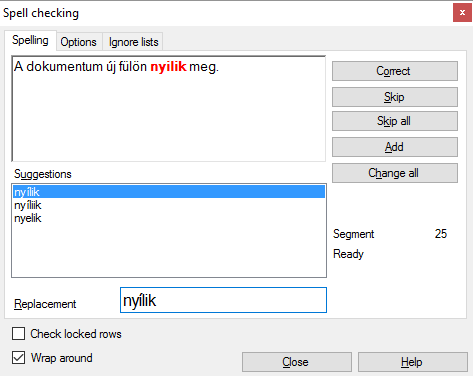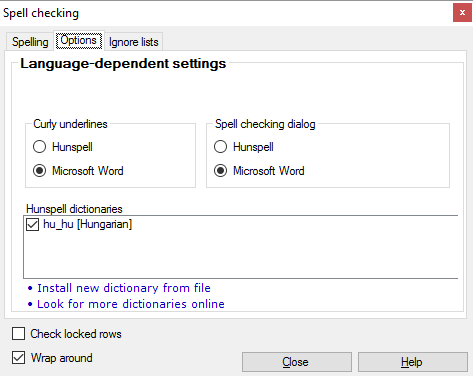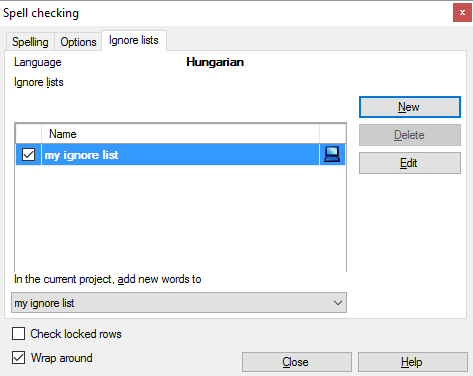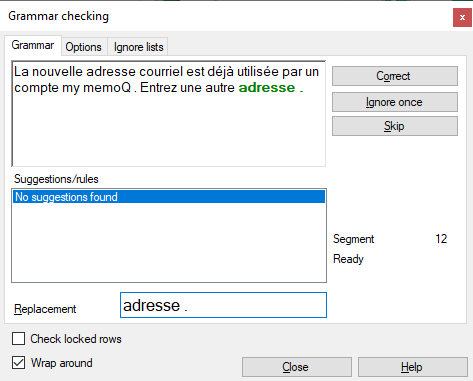Spell checking/Grammar checking
Before you deliver a translation, you are supposed to check its spelling (and grammar).
memoQ uses either Microsoft Word's spelling and grammar checker, or Hunspell, an open-source spell checker. To use Word's spelling and grammar, you need to have Word installed on your computer – together with the language pack for your memoQ project's target language.
Normally, memoQ will underline supposed spelling errors with red, and grammar problems with blue. To correct an error, right-click the underlined word or sentence, and choose a suggestion from the menu - or edit the text manually.
You need the Spell checking window only if you want to go through all spelling and grammar warnings in one go. You should do this before delivering the translation.
Copyright Notice for Hunspell
Hunspell Spelling Checker
memoQ © 2004 Kilgray - 2024 memoQ Zrt. All rights reserved.
memoQ prefers Hunspell as the alternative spelling checker. Installed as separate program.
© 2003–2008 László Németh; FSF.hu Foundation. Licensed under GPL/LGPL/MPL tri-license.
Set up spell checking first: To do that, open Options, and choose the Spelling and grammar item in the list.
Spell check runs grammar, too: If Microsoft Word is on your computer, and it has the grammar checker for your target language, memoQ will show grammar problems in the same window - unless you turn it off in the Options window (Spelling and Grammar pane, Grammar tab).
How to get here
- Open a project.
- Open a document for editing.
- On the Translation ribbon, click Spelling/Grammar. Or, press F7.
The Spell checking window opens. It keeps you waiting until it finds the first spelling error.

What can you do?
Check spelling
Go through the spelling errors in the document, and decide what to do about each.
memoQ shows spelling errors in red, and grammar problems in green. Grammar problems will show only if Microsoft Word is on the computer, and it has the grammar checker for your target language.
When memoQ stops at an error, choose one of the following:
- Correct the error just this once: From the Suggestions list, choose a suggestion, or type the correction in the Replacement box. Click Correct.
- Correct the error everywhere in the document: From the Suggestions list, choose a suggestion, or type the correction in the Replacement box. Click Change all.
- Ignore the error just this once: Click Skip.
- Ignore the same error everywhere in the document: Click Skip All.
- Tell memoQ that this is not a spelling error: Click Add. memoQ will add this to an ignore list.
If you start spell checking in the middle of a document, memoQ will start over at the end. To turn this off, clear the Wrap around check box.
Normally, memoQ does not check locked rows: To check them, check the Check locked rows check box.
Not all languages: There is no spell checking in Japanese, Chinese, Korean. Also, for Vietnamese and Thai, spell checking is not supported. For these languages, use the grammar checker.
You can set up the spell checker and change the spell checking settings in the Spell checking window. To do that, click the Options tab. The settings are the same as in Spelling and Grammar in Options. (You cannot choose the language because this window works for the current target language.) To learn more: See Help about the Spelling and grammar pane of Options.

When you click Add to tell memoQ that a word is correct, memoQ adds it to an ignore list. To do this, you need an ignore list first.
Ignore lists are resources that you can manage and edit in the Resource console, too.
To manage ignore lists in the Spell checking window, click the Ignore lists tab.

- To create a new ignore list: Click New. The Create new ignore list window opens.
- To edit an ignore list: On the left, select the ignore list. Click Edit. The Edit ignore list window opens.
- To tell memoQ where to add new words in the project: From the In the current project, add new words to drop-down box, choose the ignore list you want to use.
Check grammar
After spell checking finishes, the Grammar checking window opens:

memoQ shows spelling errors in red, and grammar problems in green. Grammar problems will show only if Microsoft Word is on the computer, and it has the grammar checker for your target language.
When memoQ stops at an error, choose one of the following:
- Correct the error just this once: From the Suggestions/rules list, choose a suggestion, or type the correction in the Replacement box. Click Correct.
- To mark this finding correct and continue: Click the Ignore once button,
- To leave this finding marked as an error and continue: Click the Skip button,
When you finish
To return to the translation editor: Click Close.